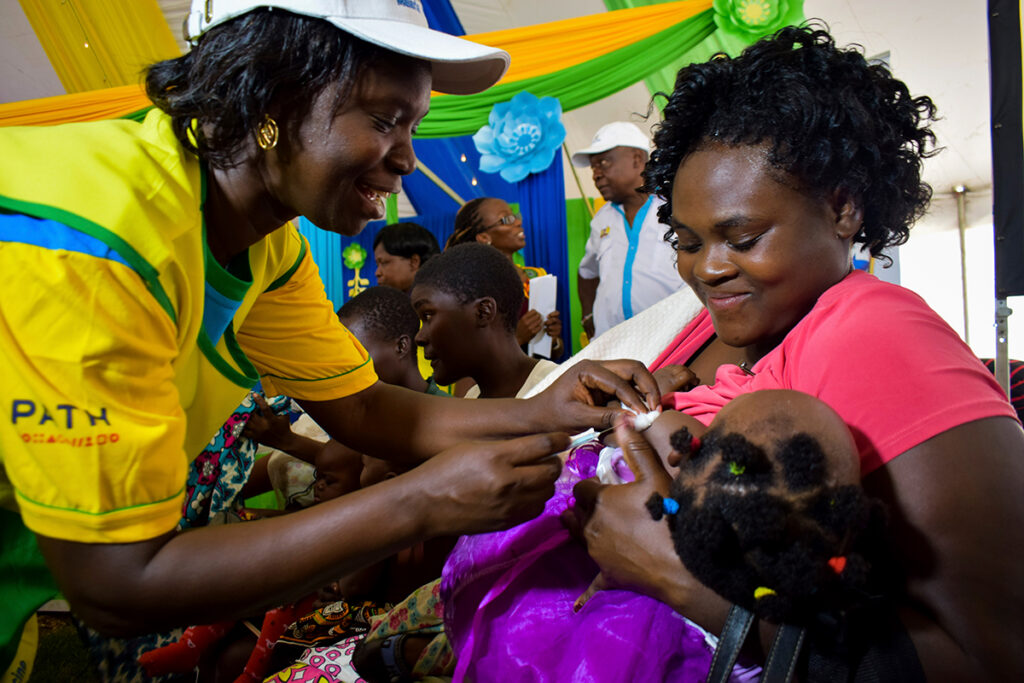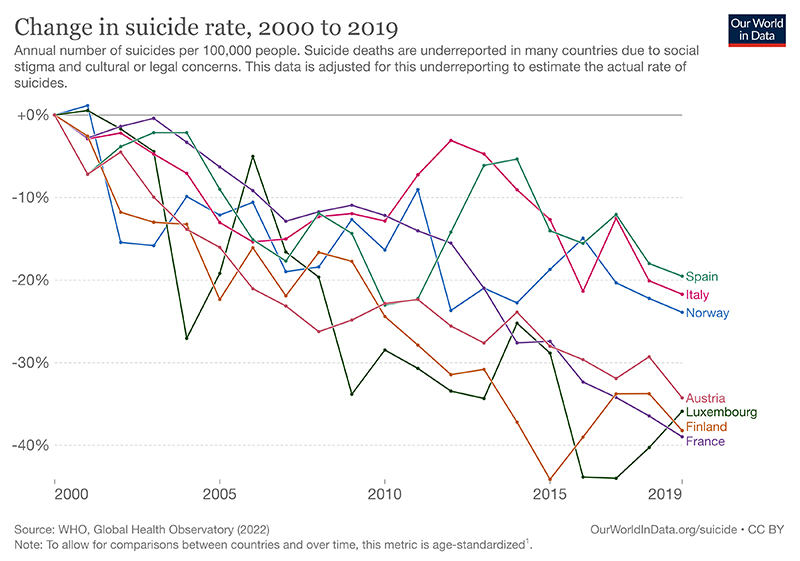Volcanoes are erupting in The Philippines, but on-fire Australia received some welcome rain. The Iran war cries have been called off and The Donald’s military powers are about to be hamstrung by the Senate. Meanwhile, his impeachment trial is starting, and we’re all on Twitter for a front-row seat.
What Could Go Right? Extraordinary tools to eradicate disease
Thousands of children’s lives have already been saved by brand new vaccines.
This is our weekly newsletter, What Could Go Right? Sign up here to receive it in your inbox every Thursday at 6am ET. You can read past issues here.
With great power comes great success
Humans have harnessed so much power to prevent illness and premature death that the world today would be unrecognizable to most people throughout history. This power has come in myriad forms. One of them, perhaps as controversial as it is impactful, is vaccines. It’s because of that ongoing—although currently more muted—controversy around vaccines of all types that I would like to do a quick tour of hot-off-the-press vaccine news this week. What vaccines have done for disease eradication in the 20th and 21st centuries is extraordinary, and continues to be so.
Present success!: Longtime readers of this newsletter will know that we have been tracking the development of malaria vaccines, which, after 100 years of research, had gone mostly nowhere until very recently. A breakthrough came in the early 2010s, and a pilot distribution program began in 2019. Since then, more than 1.2 million children in Kenya, Malawi, and Ghana have received the world’s first effective vaccine against malaria. (It is also the first vaccine for a parasite.)

A health worker vaccinates a child against malaria in western Kenya, 2019. | Associated Press
The World Health Organization just released the results of that program: a “dramatic reduction” in malaria cases and hospitalizations. Their modeling indicates that one child was saved for every 200 vaccinated. All three countries are now expanding their vaccination efforts. Kenya is the latest to do so this month, after Malawi in November 2022 and Ghana in February 2023. The vaccine being used currently is Mosquirix, which is not an ideal candidate for ending malaria entirely. It requires four doses and is only modestly effective. So this already encouraging outcome, combined with the other promising malaria vaccines that are moving along the trial-approval-distribution process, makes for even more encouraging progress on the horizon.
For the near-term future: China has developed and just approved its first mRNA vaccine for Covid-19. Throughout the pandemic, China has limited its citizens to its own vaccines, Sinopharm and Sinovac, both of which use traditional vaccine technology and are less effective than mRNA ones from Pfizer and Moderna, especially against new Covid strains. (Although they did distribute Pfizer’s oral treatment, Paxlovid.) This is good news, then, not only for China but also for the many Asian, African, and South American countries that have relied in part on donated Chinese vaccines to immunize their populations.
Has long-term potential: You’ve heard about mRNA vaccines for viruses. But have you heard of mRNA vaccines for bacteria? Now you have. Israeli researchers have developed the first, 100 percent effective (in mice) mRNA-based vaccine for the bacteria that caused the Black Death. While that may seem like a—literally—medieval issue, the plague actually does still plague humanity in parts of Asia, South America, and the United States. In addition to the potential for finally stamping out the plague, in the future, mRNA anti-bacterial vaccines could also prove useful for treating antibiotic-resistant bacteria.
If you missed it last time: Many new vaccines go through a period of controversy. The chickenpox one did, too, and now we have pretty much forgotten about it. The US was the first country to introduce the chickenpox vaccine in 1995, and since then, it has been remarkably successful, with an estimated 91 million cases, 238,000 hospitalizations, and almost 2,000 deaths avoided in the US. All of this has also netted us 23.4 billion dollars in estimated savings.
Before we go
⚖️ Malaysia is making updates to its legal system. This week, after a year of intense debate, their parliament voted to remove the mandatory use of the death penalty, abolish natural-life prison sentences, and cut down on the number of crimes eligible for capital punishment. Whether a defendant receives the death penalty or a sentence of 30 to 40 years will now be up to the discretion of a judge. “Previously,” The Diplomat reports, “courts had no choice but to impose the death penalty for . . . murder, treason, kidnapping, terrorist acts, and drug trafficking,” as well as other offenses. The 1,318 people currently on Malaysia’s death row, most of whom, The Diplomat says, are non-violent drug offenders, may also be spared. Next up, Parliament will decide whether or not to decriminalize suicide.
⚡ In just over ten years, the United Kingdom went from a third of their electricity generated by coal to just over two percent. Carbon emissions in the power sector have fallen over a third, and the UK is now gunning for complete decarbonization of the sector by 2035. The US is making strides as well. Coal is on its way out, and solar and wind are on their way in.
For our readers that believe we can’t be lured into a false sense of security: these changes are not happening fast enough to meet the globe’s 1.5 Celsius target. For our readers who are totally freaked out and think the world is going to end in 12 years: all is not lost if we surpass 1.5 degrees. We can overshoot and come back down. No matter where you fall on the concern spectrum, more on-the-ground effort is needed! Let’s keep pushing and not give into climate complacency or doomism.
Below in the links section, EV-charging fast food restaurants, gene-edited lungs, new water on the moon, and more.

Suicide rates have fallen worldwide since 2000, with many countries recording substantial decreases. “These large declines in suicide rates,” Our World in Data reports, “have been partly driven by greater awareness and help for people at risk, improvements in mental health treatment, and restrictions on some of the methods of suicide.”
How to Create Positive Change | S4 E7

How does change actually occur? And what are the best tactics for bringing large coalitions together? Hosts of Democracy-ish, Danielle Moodie and Wajahat Ali, discuss the balance between angry revolution and individual hope, and what ultimately gets people on board with a movement. Plus, we take a look at the World Happiness Report and the college enrollment drop. | Listen to the episode
The Globalization Myth | S4 E8

How have regional dynamics shifted in an increasingly globalizing world? And what is going on in Latin America and Mexico, and how will it affect the United States? Today we talk with Shannon O’Neil, vice president, deputy director of studies, and senior fellow for Latin America Studies at the Council on Foreign Relations, as well as the author of the book The Globalization Myth: Why Regions Matter. Plus, we take a look at medicine, drug, and vaccine breakthroughs from around the world. | Listen to the episode
Progress, Please
(Found good news? Tweet at us @progressntwrk or email.)
Other good stuff in the news 🫁
Energy & Environment:
- The next hot fast food menu item? Electric car charging | Axios
- What the world can learn from Bangladesh’s climate solutions | NPR
- First cheetah cubs born in India since extinction 70 years ago | BBC
- Global renewables capacity grew by 10% last year | Reuters
Science & Tech:
- New nanoparticles can perform gene editing in the lungs | MIT News
- Bacterial ‘nanosyringe’ could deliver gene therapy to human cells | Scientific American
- 3D printing promises to transform architecture forever—and create forms that blow today’s buildings out of the water | The Conversation
- More water was found on the moon. Here’s how it got there. | The Wall Street Journal
- A gene therapy cure for sickle cell is on the horizon | Wired
Politics & Policy:
- Oklahoma court OKs abortion to preserve mother’s life | Politico
- Biden administration releases road map to scale up nuclear, hydrogen, and energy storage | Grist
- Australia ends ‘wasted decade’ with emissions reduction law, leader says | The Washington Post
- California, LA, and Japan sign agreements for green shipping initiative | The Maritime Executive
- High-capacity-magazine bans could save lives. Will they hold up in court? | The Washington Post
- Populism appears to be falling out of favor. For now. | Positive News
- Senate votes to repeal Iraq War power authorizations, 20 years after US invasion | CNN
- Kentucky’s governor signs medical marijuana legalization bill into law | Marijuana Moment
- The 2023 EV tax credit: A US car buyer’s guide | Heatmap
Public Health:
- Nigeria’s annual AIDS-related deaths have fallen significantly | Punch
- Child and mother mortality rates have decreased significantly in Laos | The Laotian Times
- New Zealand’s teen births and abortions keep declining | RNZ
- First over-the-counter opioid overdose treatment gets FDA approval | NBC News
- Loneliness in the US subsides from pandemic high | Gallup
- Debunking a cat’s misleading Covid fertility graphs | Maximum Truth
TPN Member originals 🧠
(Who are our Members? Get to know them.)
- Should the US ban TikTok? | Ian Bremmer
- The extraordinarily misguided attack on TikTok | Zachary Karabell
- The risk of slowing down AI progress | James Pethokoukis
- Four lenses on AI risks | Jason Crawford
- The Iraq War anniversary | Isaac Saul
- What readers want from social media in the future | Bina Venkataraman
- Office armageddon | Diane Francis
- Transforming criminal justice | Judge Victoria Pratt
- How big should the House be? Here’s what readers suggested. | Danielle Allen
- Buying a house probably won’t make you happier | Arthur C. Brooks
- Does military service teach tolerance? | Theodore R. Johnson
- The ultimate guide to rationality | Steven Pinker
- Matthew Goodwin on why the last decade of politics has been so bizarre | Yascha Mounk
- The illegally carried handguns are the problem | Matthew Yglesias
- Too much of America is emptying out. More immigration can help. | Matthew Yglesias
Department of Ideas 💡
(A staff recommendation guaranteed to give your brain some food for thought.)
The Statistically Flawed Evidence That Social Media Is Causing the Teen Mental Health Crisis | Reason
Jonathan Haidt’s integrity and transparency are admirable, but the studies he’s relying on aren’t strong enough to support his conclusions.
Why we picked it: A statistician thinks that the studies behind the “social media is depressing teens” are not valid. Since this theory is quite popular and has the potential to drive policy, it’s important we get to the bottom of this. Give it a read and see what you think. —Emma Varvaloucas
Until Next Time
The pro-dog and pro-raccoon media are at it again, twisting reality to suit their respective narratives. 🐕🦝


